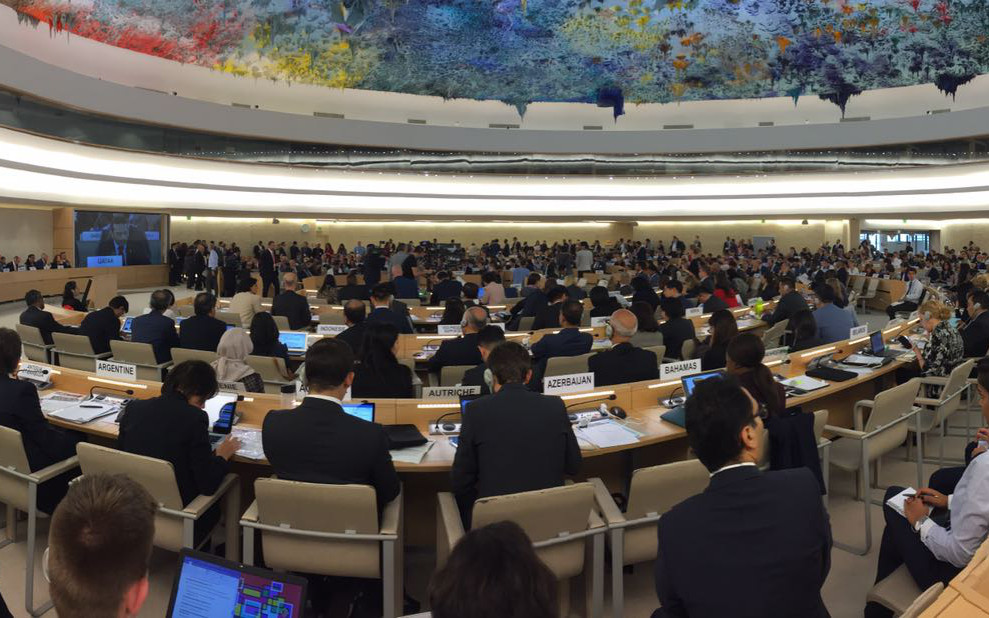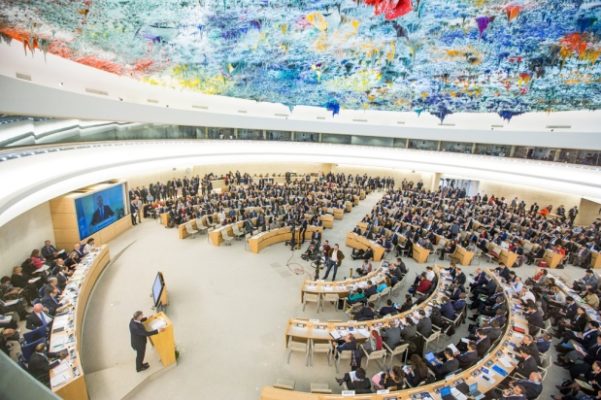
From 11 to 29 September 2017, Americans for Democracy & Human Rights in Bahrain (ADHRB) participated in the 36th Session of the United Nations Human Rights Council (HRC) in Geneva to bring increased attention to the ongoing human rights abuses in Bahrain, Saudi Arabia, and other states of the Gulf Cooperation Council (GCC). Over the course of the three-week session ADHRB delivered 26 interventions and organized three side events. ADHRB was pleased to hear its own concerns echoed by UN officials and welcomed their calls for reform, as well as criticisms of abuses.
At the beginning of the Council’s session, UN High Commissioner for Human Rights Zeid Ra’ad Al-Hussein, delivered an oral report detailing the current human rights situation across the globe. In his address the High Commissioner expressed grave concern over the deterioration of human rights in Bahrain. He spoke regarding the numerous restrictions on civil society actors, stating that “the democratic space in the country has essentially been shut down,” and referred to reprisals against activists and the government’s attempts to “paper over” the violations occurring in Bahrain.
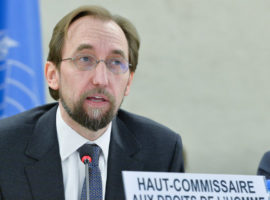
It should be noted that prior to this session of the Human Rights Council, the Government of Bahrain again stepped up its wide-reaching repression of civil society. In line with the practice the government employed during the 32nd session of the HRC and every subsequent session, the government issued travel bans targeting human rights defenders and political activists who have previously cooperated with the Council. Some of these brave individuals include Fatima al-Halwachi and Zainab al-Khamees; opposition leaders Ebrahim Sharif and Radi al-Musawi; activist and torture survivor Rihanna al-Musawi and her husband; and the father of Ali al-Singace, one of the three individuals put to death in January 2017 after being tortured into confessing to violent crimes.
On 11 September, ADHRB Legal Fellow Devin Kenney delivered ADHRB’s first oral intervention under HRC Item 3’s interactive dialogue with the Working Group on Enforced or Involuntary Disappearances, raising concerns regarding both short- and long-term disappearances, noting the ongoing cases raised by the Working Group in Bahrain and the mandate’s outstanding request for a country visit to visit the kingdom. He also highlighted the cases of Fadhel Abbas Radhi and Sayed Alawi Hussain al-Alawi, both of whom remain disappeared.
On 12 September, ADHRB Advocacy Officer Michael Payne delivered an oral intervention under the Council’s Item 2 General Debate on behalf of ADHRB. Payne provided contextual support for the High Commissioner’s opening remarks regarding the human rights abuses ongoing in Bahrain. He also noted the joint communication by six special procedure mandates this session, which presented a wide-ranging thematic critique of Bahrain’s flawed legal frameworks, restrictions on civil and political associations, repression along religious lines, criminalized peaceful expression and assembly, and arbitrary deprivations of nationality.
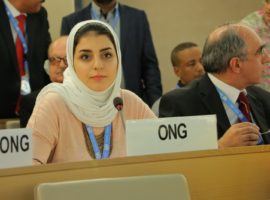
Also on 12 September, Asma Darwish delivered an oral intervention on behalf of ADHRB under the Council’s Item 2 General Debate with updates from the High Commissioner. She highlighted the High Commissioner’s remarks on the reprisals and harassment that governments direct against human rights activists. She raised the case of Ebtesam al-Saegh, who was arrested by the Bahraini government and subjected to physical, psychological, and sexual torture as a direct consequence of her participation in HRC 34 and the examination of Bahrain’s human rights record under Universal Periodic Review procedure. Darwish called upon all states to respond when states like Bahrain seek to undermine and degrade the Human Rights Council through violent suppression.
And also on 12 September, Advocacy Associate Tyler Pry speaking on behalf of ADHRB, delivered an oral intervention under the Council’s Item 3 interactive dialogue with the Special Rapporteur on the human rights to safe drinking water and sanitation. He highlighted reports from local activists in Bahrain that water from the public taps is in large part only safe to drink in areas where the ruling family lives. Pry also mentioned the case of an environmental activist, Mohamed Khadim, who was shot dead along with four others by Bahraini security forces during a peaceful protest in Duraz in May 2017.
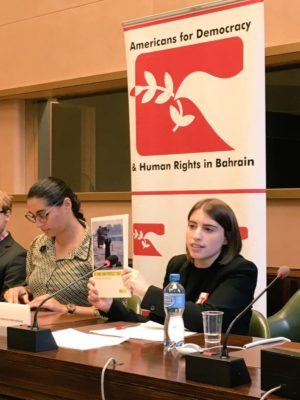
On 13 September 2017, Americans for Democracy & Human Rights in Bahrain and Amnesty International hosted a Panel entitled “Bahrain: Systematic State Abuse in the Name of Countering Terrorism,” focused on how Bahrain’s state security agencies systematically violate human rights under the guise of counterterrorism. The event was co-sponsored by Human Rights Watch, Reprieve, the Bahrain Institute for Rights and Democracy, the Gulf Center for Human Rights, the European Center for Democracy and Human Rights, Article 19, International Service for Human Rights, the International Federation for Human Rights, and Index on Censorship. The panel was moderated by Laila Matar of Human Rights Watch, and panelists included Ariel Plotkin of Amnesty International, Devin Kenney of ADHRB, Harriet McCulloch of Reprieve, and (via video) exiled Bahraini activist Yusuf al-Hoori. During the panel Plotkin presented Amnesty International’s new report, “No One Can Protect You,” about the Bahraini government’s increasing suppression of political and civil society activists and human rights defenders, by means including torture, nationality revocations, forced expulsions, and the excessive use of force against civilians.
On 13 September, Asma Darwish of Salam for Democracy and Human Rights together with ADHRB delivered an intervention under the Item 3 interactive dialogue with the Working Group on Arbitrary Detention. In her intervention, Darwish raised numerous cases of Bahraini human rights, religious, and political activists who have been arbitrarily detained due to their activism. These cases include Nabeel Rajab (whose trial was postponed yet again this past week), Abdulhadi al-Khawaja, Sheikh Ali Salman, Ebrahim Sharif, Fadhel Abbas, and Sheikh Isa Qassim. She also reminded the Council of the Working Group’s 2014 conclusion that “the duty to comply with international human rights law rests not only on the Government, but on all officials of the State, including judges, the police, security officers, and prison officers.”
On 13 September, ADHRB’s International Advocacy Officer, Michael Payne, delivered an oral intervention under the Item 3 interactive dialogue with the Working Group on Mercenaries. Payne discussed the United Arab Emirates’ extensive use private military contracting companies and foreign recruits and their employment on assignments that “necessarily entail the violation of human rights.” In this context, he raised the case of the UAE’s use of mercenaries in Yemen. He cited the hundreds of Latin American soldiers deployed to Yemen as part of the Saudi-led intervention. Such units have reportedly swelled to at least 1,800 personnel made up entirely of foreign recruits.
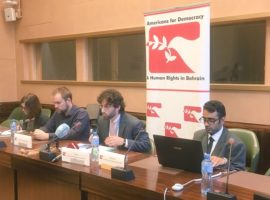
On 14 September, ADHRB hosted a panel on “Saudi Arabia: The Context of the Paramilitary Operations in Awamiyah and Ongoing Executions” discussing the ongoing state violence in the town of Awamiyah and the long-term pattern of unlawful executions in the Kingdom, which have lately reached a new crescendo. ADHRB’s Saudi Advocacy Associate Tyler Pry moderated the event, opening by identifying the parameters of the discussion and introducing the panelists: Alex MacDonald, a journalist with Middle East Eye; Harriet McCulloch, Deputy Director of the UK anti-death penalty organization Reprieve; Amin Nemer, an exiled Saudi activist who submitted a video presentation for the event; and Adil Alsaeed, an activist with the European Saudi Organization for Human Rights.
Also on 14 September, ADHRB’s Legal Fellow Devin Kenney delivered an oral intervention during the Item 3 interactive dialogue with the Special Rapporteur on Unilateral Coercive Measures. The intervention raised concerns over the Saudi-led coalition’s total air and sea blockade on Yemen, which has destroyed Yemen’s economy and caused widespread human and physical devastation. These measures constitute the greatest impediment to a peaceful political transition in Yemen, having stalled the political negotiations that were ongoing when the external intervention began, and ultimately undermine international peace and security in the region.
Later on 14 September, ADHRB’s Advocacy Associate Tyler Pry delivered an oral intervention during the Panel on Unilateral Coercive Measures. In the intervention, Pry raised concerns over the Saudi-led coalition’s air and sea blockade of Yemen and airstrikes on civilians and civilian infrastructure. These measures are currently causing the Yemeni population to be deprived of essential goods including food and medicines, and over the longer run will prevent them from freely pursuing their own socioeconomic development. Pry emphasized that not only do these measures have a severe humanitarian impact, but they also threaten regional stability and cause greater human displacement.
On 18 September ADHRB’s Michael Payne delivered an oral intervention under the Item 3 General Debate. In his intervention, Payne discussed the human rights work of the UN’s special procedures offices on Bahrain. He highlighted the reprisals against Ebtesam al-Saegh and the family of Sayed Ahmed al-Wadaei for their cooperation with the Human Rights Council. Additionally, Payne highlighted the role of the National Security Agency in several reprisal cases. He stated that this body acts as a secret police force that raids homes and protests, forcibly disappears, and tortures with impunity.
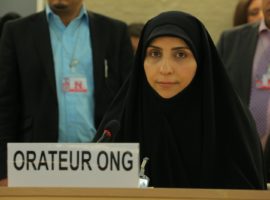
In a second intervention delivered on 18 September, ADHRB’s Case Worker Salma Moussawi addressed the Council under the Item 3 General Debate. In her intervention, Moussawi raised concerns over the impending executions of seven minors in Saudi Arabia. She mentioned Ali al-Nimr, Dawood al-Marhoon, and Abdullah al-Zaher, who have been at risk of imminent execution since 2014. She also raised the cases of Mujtaba al-Suwaikat, Abdulkareem al-Hawaj, Salman al-Quraish, and Abdullah al-Sareeh, who were sentenced to death more recently. She called on Saudi Arabia to uphold its commitments under international covenants forbidding the execution of minors.
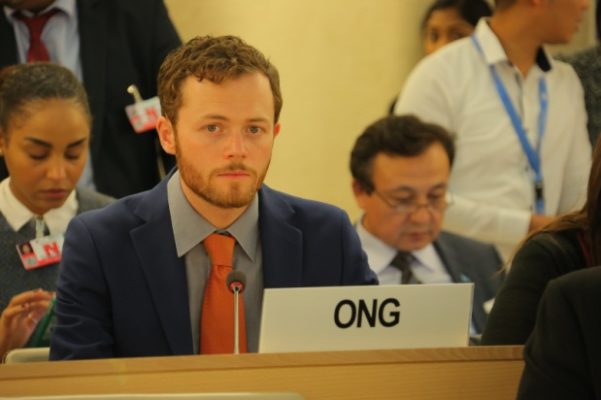
On 19 September, Sam Walton delivered an oral intervention on behalf of ADHRB during the Item 4 General Debate. In the intervention, ADHRB expressed concern over the Council’s failure to adequately address Bahrain’s widespread and systematic human rights abuses, and further concern that some states, including the United States, the United Kingdom, and Switzerland are sidelining human rights concerns in the name of economic or security interests. Walton concluded the intervention by recalling each of these Member States’ support for a joint statement last session calling for greater objectivity in addressing human rights problems, and called for them to renew their collective protest over the human rights crisis in Bahrain.
Also on 19 September, Yusuf al-Hoori, on behalf of ADHRB, delivered an oral intervention during the Item 4 General Debate. In his intervention, al-Hoori discussed the mass hunger strike by detainees at Jau prison, as well as Bahrain’s militarization of its public health systems, including the ambulance service. He noted the open letter sent by a group of the Jau prisoners who decried the failure of Bahrain’s National Institute for Human Rights, the Ministry of Interior Ombudsman, and the Prisoners’ and Detainees’ Rights Commission for failing to address repeated complaints of abuse. Given the failure of these accountability mechanisms, detainees report that they feel they have no recourse beyond peaceful protest and hunger strike.
In a third oral intervention on 19 September, Jawad Fairooz delivered a statement on behalf of ADHRB, Salam DHR under the Item 4 General Debate. The intervention highlighted Bahrain’s use of its expansive counter-terror law to justify crushing, systematic restrictions on expression and assembly and on human rights and civil society activists. He highlighted how in January the king restored law enforcement powers to the National Security Agency, the kingdom’s primary intelligence service. This reversed a 2011 recommendation to restrict the NSA’s authority after it was found to have systematically committed violent abuses. Later, in April, the king amended the constitution to allow military courts to try civilians charged with terror offenses, further empowering so-called counterterror authorities like the NSA. Fairooz also noted that the NSA is often the body responsible for the reprisals taken against activists who cooperate with the Human Rights Council.

On 20 September, the UN’s Assistant Secretary-General for Human Rights Andrew Gilmour spoke out on the issue of reprisals against human rights activists, specifically naming Bahrain as an “egregious case”: “Since June 2016 Bahraini civil society groups attempting to cooperate with the Human Rights Council and its mechanisms have been interrogated, intimidated, subject to travel bans, and even arrested or detained, causing an atmosphere of fear” among such activists. Gilmour’s full report (A/HRC/36/31) also raises the Bahraini case, citing the trials of Nabeel Rajab and Ebtesam al-Saegh as examples of Bahrain’s practices of intimidation and retaliation.
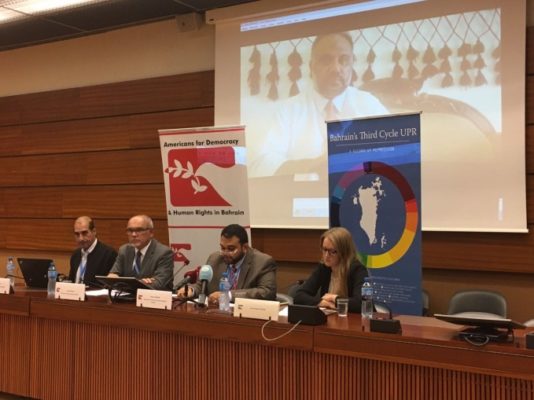
20 September also saw the convening of ADHRB’s third side panel, titled “Bahrain’s Third Cycle UPR Adoption: Civil Society Prescriptions for Implementation and International Accountability” and coinciding with the Human Rights Council’s formal adoption of its third round of recommendations to Bahrain under the Universal Periodic Review process. The panel examined the previous set of recommendations and assessed how Bahrain has measured up, addressed what it must do going forward, and made recommendations to the international community on how to ensure future compliance. The panel was moderated by ADHRB’s Executive Director, Husain Abdulla, while the speakers were Khalid Ibrahim, Executive Director of the Gulf Center for Human Rights; Sara Brandt, Policy & Research Analyst at CIVICUS; Zahra Albarazi, Senior Researcher at the Institute on Statelessness and Inclusion (via Skype); and Jawad Fairooz, a former Bahraini MP and now Executive Director of Salam for Democracy and Human Rights.
Later on 20 September Yusuf al-Hoori delivered an oral intervention on behalf of ADHRB during the Interactive Dialogue with the Special Rapporteur on Indigenous Peoples. In his intervention, al-Hoori drew attention to the longstanding issue of discrimination against Bahrain’s indigenous majority, the Baharna population. He specifically drew attention to their marginalization across all levels of Bahraini society and the destruction of their cultural and religious heritage by Bahraini authorities. Al-Hoori highlighted the fact that at least 53 historic Baharna and Shia places of worship have been destroyed or damaged in Bahrain since 2011, preventing the community from accessing adequate facilities to practice their faith and carry forward their cultural heritage.
Lastly on 20 September, ADHRB’s Michael Payne delivered an oral intervention during the Interactive Dialogue with the Human Rights Council’s Advisory Committee. In his intervention, Payne raised the issue of Bahrain’s reprisals against human rights defenders and civil society activists who have cooperated with international human rights mechanisms and bodies, recalling the cases of Ebtesam al-Saegh, Rihanna al-Mosawi, and Zainab al-Khamees among many others. Payne noted how the Bahraini government is one of the most systematic offenders in terms of HRC reprisals, targeting dozens of civil society actors for judicial harassment both before and after Council sessions.
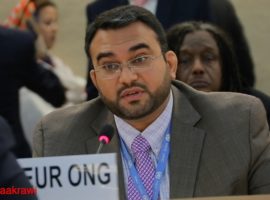
On 21 September, ADHRB’s Executive Director Husain Abdulla delivered an oral intervention on Bahrain’s Third Cycle UPR. In his intervention, Abdulla highlighted how the Bahraini government has increased its repression since suppressing the 2011 pro-democracy movement, in particular through detention and abuse of human rights defenders and activists. He asked how it is, if the law applies to all Bahrainis, that members of the government like Talal al-Khalifa and Nasser bin Hamad can get away with torture and human rights abuses.
Next on 21 September, ADHRB’s International Advocacy Officer Michael Payne delivered a second intervention on Bahrain’s UPR in which he noted the government’s almost complete refusal to implement any previous UPR recommendations and its misleading National Report, which sought to downplay the significant deterioration in the condition of human rights over the past two years. He noted that since the midterm of Bahrain’s second UPR cycle in 2014, the government has not only failed to fully implement one of its 176 recommendations, but has actually regressed on what few reform areas had seen nominal progress.
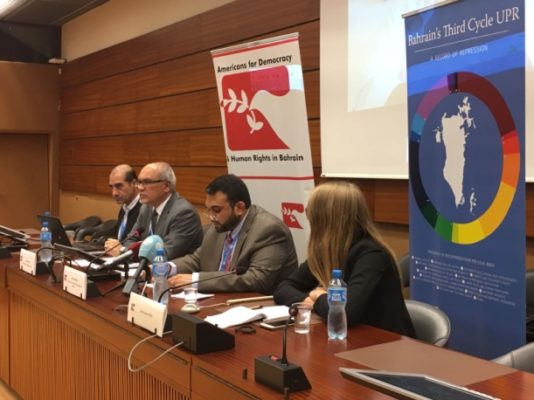
In the last intervention of the week, on 21 September Jawad Fairooz delivered a statement on behalf of ADHRB together with IDO and SALAM. Fairooz discussed Bahrain’s refusal to implement its previous UPR recommendations as well as its consistent refusal to implement the 26 Bahrain Independent Commission of Inquiry (BICI) recommendations dating from 2012. He also noted that, since BICI put out its recommendations, the Bahraini government has embarked on a systematic and widespread campaign of repression, including torture and travel bans.
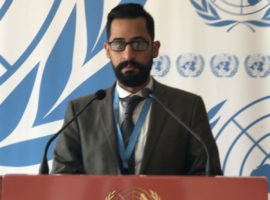
Heading up the Council’s third week, on 25 September Yusuf al-Hoori delivered an oral intervention on behalf of ADHRB during the Item 6 General Debate. In his intervention, al-Hoori highlighted the Bahraini government’s failure to implement its UPR recommendations, including its judicial harassment of human rights defenders, political activists, and civil society members who have exercised their right to freedom of expression. Additionally, he raised concerns regarding Bahraini security forces’ regular practice of arbitrarily detaining peaceful demonstrators, political activists, journalists, religious leaders, and human rights defenders without warrants or reasonable cause for arrest. Furthermore, al-Hoori brought up the three men the government executed after an unfair trial based on forced confessions, who were sentenced to death without having had one meeting with their lawyers.
Also 25 September, ADHRB Advocacy Associate Tyler Pry delivered an oral intervention for ADHRB on the United Kingdom’s failure to address several of its UPR recommendations. This intervention addressed in particular recommendations relating to the treatment of refugees and asylees and legal and policy concerns over the UK’s complicity in international human rights and international humanitarian law violations possibly amounting to war crimes. Pry raised two main concerns on the UK: that subsets of asylum seekers from British-allied Gulf countries face an unduly extended processing and approval time and that there have been ongoing, uninvestigated attacks on Bahraini asylees in the UK by Bahraini government agents.
Later on 25 September, Pry delivered another joint oral intervention under the Item 8 General Debate on behalf of ADHRB and the European-Saudi Organization for Human Rights. Pry highlighted the recent wave of arrests by Saudi security forces targeting prominent citizens for their peaceful dissent, including the arrest of Abdulaziz al-Shubaily and Isa al-Hamid of the now-shuttered Saudi Civil and Political Rights Association. He cited details from the case including the information that security forces arrested individuals in warrantless raids in which they also seized computers and cellphones before holding those targeted in incommunicado detention. Pry added that the Saudi government is holding the individuals under its terrorism law, with threatened sentences of up to 20 years, though it appears that the individuals charged are accused mainly of using their social media accounts to criticize Saudi Arabia’s policies towards Qatar.
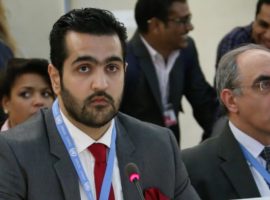
During the Item 8 General Debate on 25 September, Husain Jawad Parweez delivered a further oral intervention on behalf of ADHRB. In his intervention, Parweez called attention to Bahrain’s continued disregard for international labor commitments, particularly labor violations stemming from economic reprisals levied against activists for their peaceful exercise of expression during the 2011 mass pro-democracy protests. He raised the issue of the hundreds of workers in both the public and private sectors who were fired from their jobs based on their participation in popular peaceful protests. Despite mediation and negotiations with the ILO, the majority of those affected remain without resolution of their cases, more than six years later. Furthermore, prominent labor leaders have been subject to intimidation by state security agents.
On 26 September ADHRB Advocacy Associate Tyler Pry delivered an oral intervention during the Item 9 General Debate, during which he stressed Saudi Arabia’s failure to respect its obligations under the Durban Declaration and Programme of Action, which calls on states to protect religious and ethnic groups from discrimination. Contrary to its obligations, Saudi Arabia has conducted a paramilitary operation in the Shia-majority town of Awamiyah which has killed at least 24 residents. Instead of compensating the residents for the demolition of their homes or providing alternative housing for the local Shia populace, the government instead has forcibly evicted thousands of Shia locals in a military action that has exacerbated already high poverty levels.
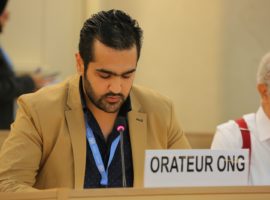
Also on 26 September, Husain Jawad Parweez addressed concerns over Bahrain’s failure to respect its obligations under the Durban Declaration and Programme of Action, speaking under the Item 9 General Debate. Parweez drew attention to Bahrain’s systematic discrimination against and persecution of its majority Shia population, including in the civil services and security and defense sectors, and the targeting of Shia religious, social, and political figures. He cited the events of last year, when the government dissolved al-Wefaq National Islamic Society – the largest political society in the kingdom – as well as a number of Shia charities. Bahrain is also targeting Shia clerics for arbitrary arrest, prosecution, and denaturalization. After revoking the citizenship of Sheikh Isa Qassim, Bahrain’s most senior Shia cleric, authorities brought charges against him relating to traditional Shia tithing practices. Bahrain has forcibly deported a number of other Shia clerics and their families.
On 28 September ADHRB Advocacy Associate Tyler Pry delivered an oral intervention during the Item 10 General Debate to address the lack of progress by Saudi Arabia in its technical cooperation program with the Office of the High Commissioner for Human Rights (OHCHR). The program is intended to reform the kingdom’s “opaque and arbitrary” judicial system, but as Pry noted, major problems remain, including the kingdom’s lack of a fully codified penal law or properly institutionalized guidelines for sentencing. Within this system, hearings and judgments rarely conform to international standards of due process and fair trial. Even at the end of OHCHR’s program the Saudi judiciary still stands in desperate need of reform.
At the close of 28 September, Yusuf al-Hoori delivered a final oral intervention on behalf of ADHRB during the Item 10 General Debate. He highlighted the Bahraini government’s failure to comprehensively and transparently cooperate with OHCHR but commended the High Commissioner’s opening statement this session for putting a spotlight on the Government of Bahrain’s obstructionism following hollow pledges of cooperation with his office. Additionally, al-Hoori called on the government of Bahrain to make genuine human rights reforms, and to cooperate comprehensively and transparently with OHCHR, which requires full access to all sectors of society and a full reporting mandate for any technical assistance program.
While this session of the HRC did not see a resolution dedicated to Bahrain, ADHRB was appreciative of the attention drawn to human rights concerns in the country by not only the High Commissioner but also various Member States attending the session. ADHRB was pleased with the subsequent discussion and resolution addressing the ongoing crisis in Yemen and the human rights abuses that have stemmed from that conflict. ADHRB fully supports increased cooperative efforts to facilitate a solution to the tragic loss of civilian life in Yemen.
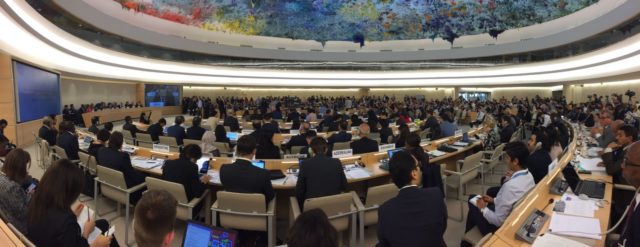
For a PDF of this statement, please click here.


